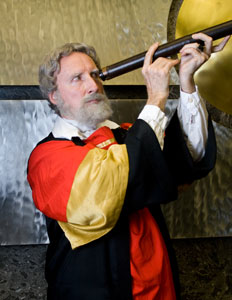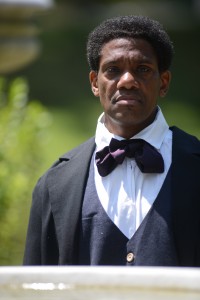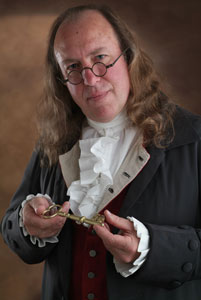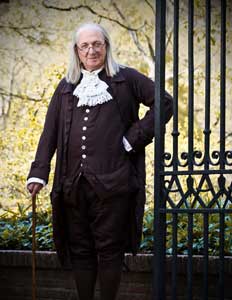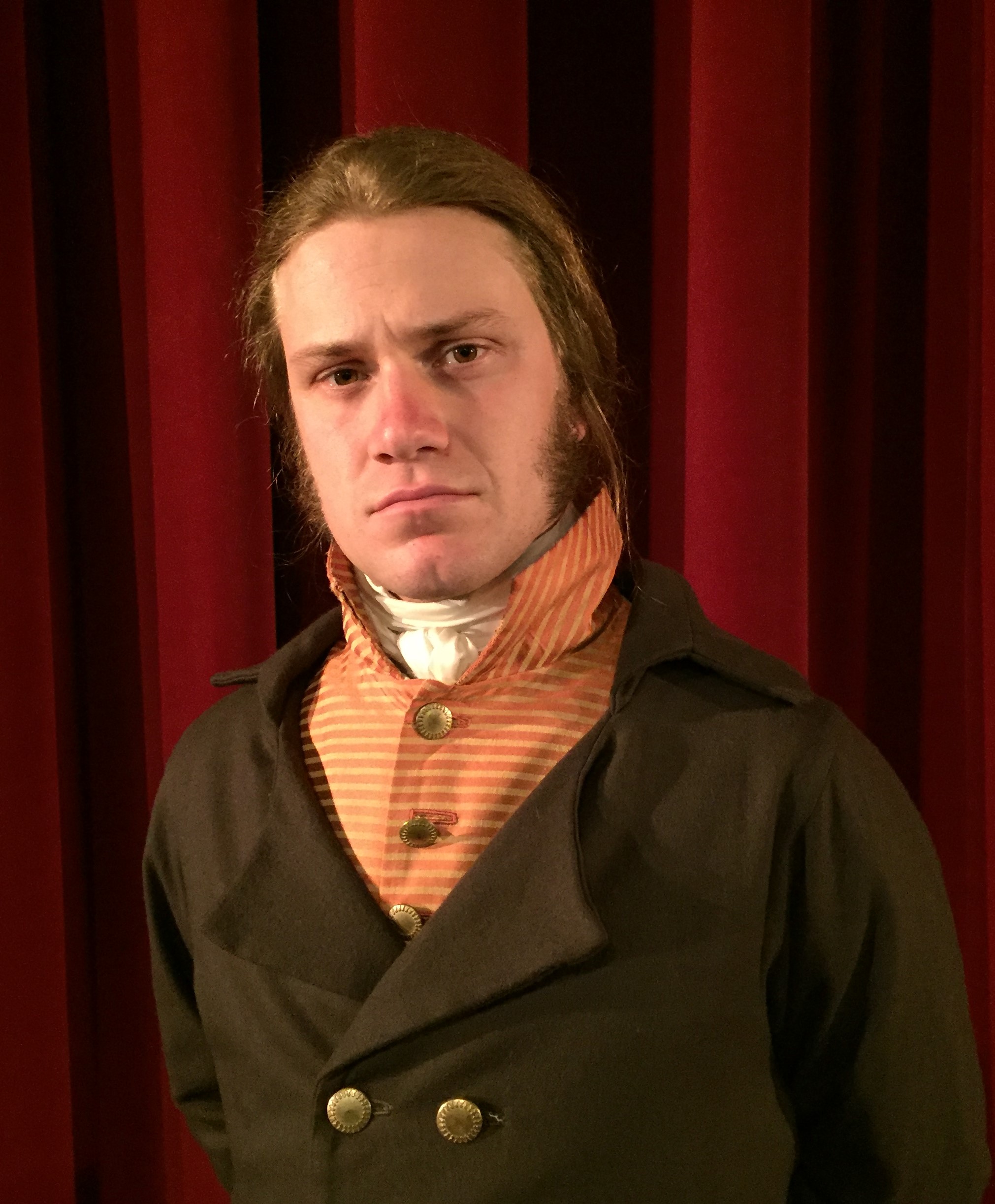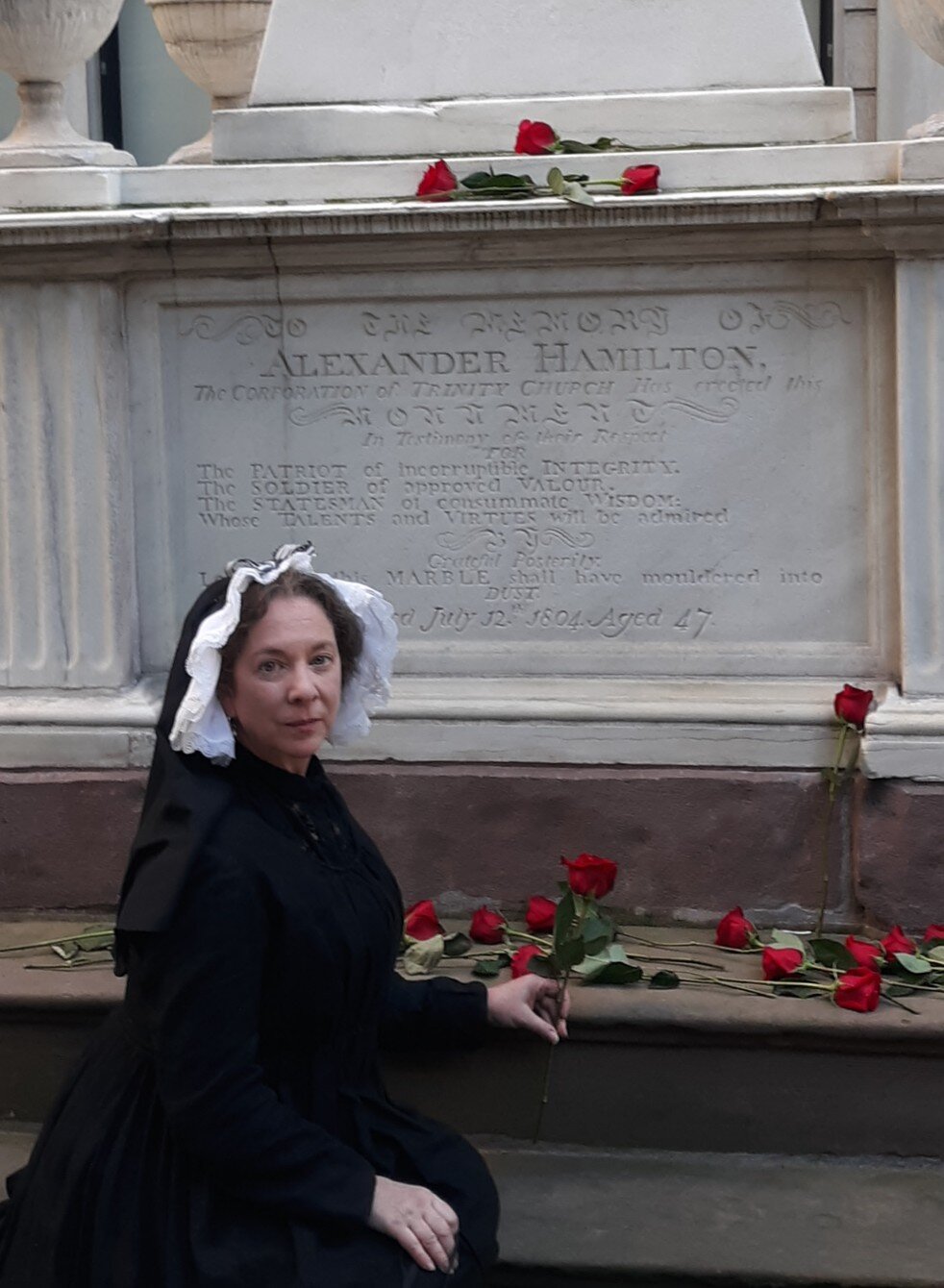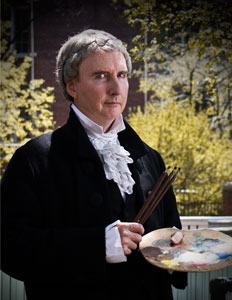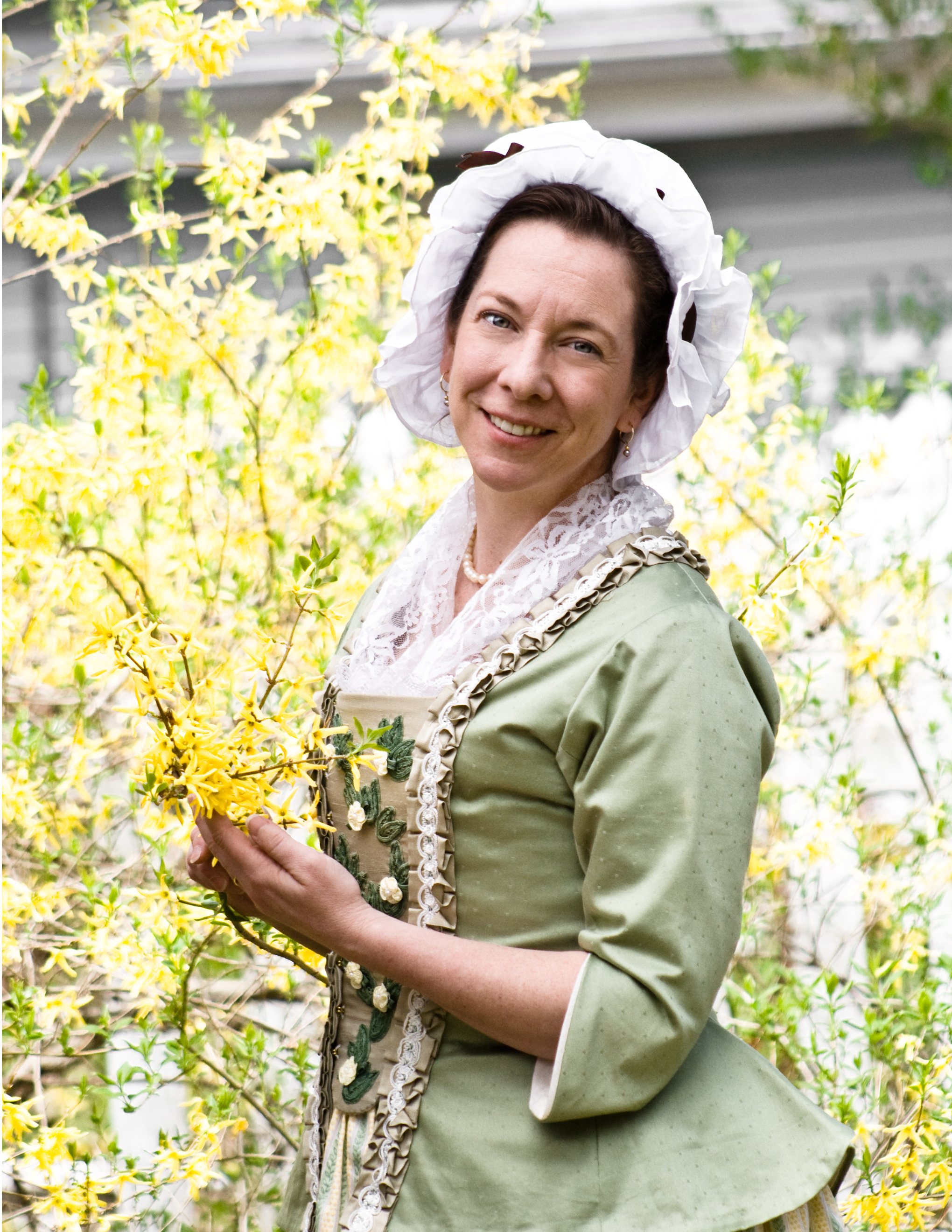Christopher Columbus PORTRAYED BY BOB GLEASON
Bob Gleason’s Christopher Columbus tells us we are all Explorers, so, “Adalante,” just keep going! Don’t be afraid to go out and look for new things, if you have an idea, follow it, pursue it, test it. Take a chance!
Bob Gleason’s Columbus invites the audience into the world of the sailor and adventurer. He urges us to fulfill our birthright as explorers, from the day we open our eyes and take a look around, but to also take care of daily life challenges.
Not just for Columbus Day anymore.
Invite Christopher Columbus to your event:
• Educational Programs: Programs for Schools, Libraries, Museums, Historical Sites • Parades: Participant • Parties: Mix & Mingle Entertaining Toasts, Relevant Quotes, Photo Ops for corporate, association and private social events • Pair with Charles Lindbergh (he went the opposite way), Amelia Earhart
Bob Gleason: Bio Actor/Historian, Interpreter, Reenactor, Impersonator
Galileo Galilei Portrayed by Bob Gleason
Bob Gleason’s Galileo Galilei tells us not to accept what has always been accepted, to test it. And if you need something that you can’t find, create it yourself. He urges us to make each day a day to learn something new. Gleason’s Galileo also exhorts us to tell the truth, even if it gets you into hot water. We remember with honor those who tell the truth.
Galileo is frequently requested in Philadelphia, reflecting the city’s previous role as the center of science and education in the United States. Examples include Rittenhouse behind City Hall looking through a telescope and the Fels Planetarium.
Bob Gleason: Bio Actor/Historian, Interpreter, Reenactor, Impersonator
William Penn PORTRAYED BY BOB GLEASON
William Penn is a treasure to American history. Born to well-connected British parents, Penn preferred his books over society. While traveling in Europe, Penn heard a Quaker Minister preach and and “a light went on” for the young man. After his father’s death, Penn inherited land in the New World. Encouraging settlers to this land this land he hoped to create a Utopian Commonwealth in “Pennsylvania”.
William Penn set the precedent for tolerance, equality, and for using financial resources to create true and lasting value. Penn codified his plans for the Pennsylvania Charter of Liberties, which presaged the Declaration of Independence, the Constitution, and the Bill of Rights. The United Nations celebrates its anniversary on Penn’s birthday, October 14th.
Consider Bob Gleason’s William Penn for all Green events, for urban planning events (“greene country town”), for events whose goal is peace and harmony
Bob Gleason: Bio Actor/Historian, Interpreter, Reenactor, Impersonator
Bob Gleason is William Penn
WILLIAM PENN PORTRAYED BY Steve Gulick
The son of a British admiral, Penn founded Pennsylvania, seeking to use government to promote peaceful co-existence and religious freedom. Penn’s essay on the necessity of creating peace in Europe was a blueprint for the League of Nations, the United Nations and the European Union. With Quaker beliefs as the legal lynchpin, anyone, no matter their background or religious practices, was welcome to settle in Pennsylvania, even powerful women who may or may not have been witches.
Steve Gulick: Bio Actor/Historian, Interpreter, Reenactor, Impersonator
WILLIAM PENN PORTRAYED BY Doug Thomas
William Penn is best known as the English-born Quaker who founded Pennsylvania. What is less well known is that Penn was also a key figure in the histories of Delaware and New Jersey. Born in 1644, Penn grew up in a time of great religious and political strife in England. Penn found himself drawn to the Religious Society of Friends who spoke of an “inner light”. Penn soon joined these Friends or Quakers as they were called and began to preach. Because Quaker teachings were contrary to the established state religion, Quakers were often persecuted- their meetings broken up and their members jailed. Penn himself spent time in the infamous Tower of London for his religious teachings and writings. He longed for a place where people would be free to worship as they choose. The death of his father and the subsequent inheritance of a debt owed by the king gave him the opportunity to create just such a place. In 1681 King Charles I granted William Penn the Provence of Pennsylvania. Penn immediately began to make plans for a capital city upon the Delaware River. Philadelphia would be his “holy experiment”; a place where people could worship based on the dictates of conscience, not on the religion of the king.
William Penn was, at points, a soldier, courtier, philosopher, preacher, and entrepreneur. The colony he created out of the green Pennsylvania wilderness was unique in many of the liberties we take for granted today. Religious tolerance, freedom from unjust imprisonment, and the right to trial by jury all were granted in Penn’s Charter of Privileges. It is in part because of these freedoms that William Penn’s “green country towne” was chosen as the place where, a century later, the Founding Fathers would meet to debate the issues that would lead to the Declaration of Independence and the Constitution.
Doug Thomas: Bio Actor/Historian, Interpreter, Reenactor, Impersonator
Characters from the 1700's
Abigail Smith Adams PORTRAYED BY KIM HANLEY
In her many letters to her husband and friends Abigail Adams expressed the concerns and accomplishments of an early American patriotic woman. Her most famous request was for Congress to “Remember the ladies” in the creation of the Constitution of the United States. It was her clear understanding that women’s influences in the domestic sphere were as integral to the development of a new nation as the the more public efforts of the founding fathers. Family economics, children’s education and civic responsibility, are the primary concerns of Abigail Adams. Her requests for legislation to benefit future generations included the necessity of education for all children regardless of sex or color, as well as the right to self-determination for all individuals including the emancipation of slaves and granting wives equal status under the law. An understanding of her hopes for posterity beg the question: If the founding fathers would have heeded Mrs. Adams advice sooner, would the nation would have been spared years of strife from civil war to civil rights? A conversation with “Dear Abigail”, 18th century wife and mother provides insight into the concerns of today’s Americans.
Ms. Hanley’s interactive school programs involve audience members who begin with large piles of money that grow smaller with each tax act that the British Parliament passes, illustrating the economic tyranny the colonials faced under British rule. Abigail contrasts this inequality with a look into an egalitarian marriage of two intelligent, articulate people who value themselves, each other and their relationship.
Invite Abigail Adams to your event: • Keynote Speaker: Women’s Issues, Patriotism, Education, and other topics on request • Educational Programs: Schools, Libraries, Museums, Historical Sites
“What a delighful way to spend an afternoon! The patrons were charmed with your excellent re-enactment of Abigail Adams and learned so much from your insights into this great lady’s life.” –Prince William Public Library, Virginia
“She kept the audience on their toes, and many said they wished she would speak forever…. We were all transported back in time as she made history come alive.” –Friends of the Stafford Library, Manahawkin, NJ
“You are the perfect Abigail Adams. You are gracious, witty, and very knowledgeable. Thank you for an absolutely wonderful evening.” B.D., Spring Lake Historical Society
Kim Hanley: Bio Actor/Historian, Interpreter, Reenactor, Impersonator
Kim Hanley’s Abigail Adams makes delightful human connections with audiences large, small, and individual!
John Adams PORTRAYED BY PEYTON DIXON
John Adams, second President of these United States, was an imperfect, burdened, yet ever-striving man. In him we recognize the desire to be something more, the concerns about what others might see in us, the struggle for balance between our personal opinions and our public persona. Throughout his life, Adams faced many challenging situations, but perhaps what is even more impressive than how he tackled these issues, or his list of accomplishments, is his humanity. While he did not necessarily believe in the innate goodness inside man, he did something remarkable, though sometimes unintentional–he strove for goodness.
Peyton Dixon: Bio Actor/Historian, Interpreter, Reenactor, Impersonator
John Adams Portrayed by Joe Doyle
John Adams was pivotal to the American Cause. His sharp legal mind enabled him to frame key precepts for the emerging United States, but Adams was shrewd enough to recommend that Thomas Jefferson write the Declaration of Independence in order to secure southern support. Adams wrote the Massachusetts Constitution, which served as the highly-original model for the United States Constitution, in that the Massachusetts document called for three equal branches of government: executive, legislative and judicial.
Mr. Adams devoted his outstanding legal talents to the cause of freedom and liberty. His bulldog tenacity and political acumen served him well as Washington’s Vice President, as the U.S. Surgeon General and as the second President of the United States. Adams encouraged an end to slavery and promoted education for both men and women.
Invite Joe Doyle as John Adams to your event:
• Educational Programs: Programs for Schools, Libraries, Museums, Historical Sites • Keynote Speaker: on leadership, panel member on rights and responsibility • Parades: Participant • Plays: The Handoff with George Washington, Thomas Jefferson, Oliver Ellsworth, Ol’ Patty, 50 minutes plus Q & A • Pair with Abigail Adams, George Washington, Thomas Jefferson •
Joe Doyle: Bio Actor/Historian, Interpreter, Reenactor, Impersonator
John Adams (Joe Doyle) speaking with visitors to the National Archives in Washington, D.C.
Joe Doyle charms and delights audiences with his wry portrayal of John Adams.
John Bartram Portrayed by Bob Gleason
Through Bob Gleason’s characterization of John Bartram, we learn to go further, to find out about life, to contribute, to have a purpose, and to respect life’s little miracles. As one of those constantly curious fellows who can’t wait to go into the woods and discover something new and to figure out where it came from and what it’s good for, Gleason’s Bartram inspires us to be active Life Participants. Bartram observed how creatures adapted to their environment and his work influenced that environment, even to affecting the British royal succession: When Bartram sent seedlings to the Prince of Wales, the Royal insisted on being present when they were being planted – during rain – and he died. The Prince’s successor was George III. Again, every action has the potential for far-reaching consequences.
An early advocate of ecology and the importance of living in harmony with nature, Bob Gleason’s John Bartram is perfect for Arbor Day, for Green events, for events with the Audobon Society or Philosophical Society, and for events at Bartram’s Garden.
Invite John Bartram to your event:
• Educational Programs: Programs for Schools, Libraries, Museums, Historical Sites • Mix & Mingle, Entertaining Toasts, Relevant Quotes, Photo Ops for corporate, association and private social events
Bob Gleason: Bio Actor/Historian, Interpreter, Reenactor, Impersonator
James Forten PORTRAYED BY KEITH HENLEY
Born a free man in Philadelphia, James Forten began working at seven years old following the passing of his father. He attended the African School, run by Quaker abolitionist Anthony Benezet until he was nine. At 14, Forten was serving on a privateer ship during the Revolutionary War. The ship was captured by the British, but as a result of a bond of friendship he had formed, he was held a prisoner, not sold into slavery, until his release 7 months later. At which time he walked from Brooklyn to Philadelphia to rejoin his family.
He apprenticed as a sail-maker, became foreman, and eventually bought the sail loft itself, and set about turning the business into one of the most successful of its kind in Philadelphia, thus making himself one of the city’s wealthiest citizens. Forten used his wealth and influence to support many causes, particularly the abolition of slavery. Toward this goal he signed a petition calling for the abolition of the slave trade and modification of the Fugitive Slave Law. With Reverend Richard Allen, he worked to establish the first Convention of Color in 1817. In 1833, Forten helped form and finance the American Anti-Slavery Society. He wrote many pamphlets as “a Man of Color” as well as contributing as a writer and supporter of TheLiberator, an abolitionist newspaper. He continued his efforts for equal civil rights until his passing at 75 years of age.
Keith Henley: Bio Actor/Historian, Interpreter, Reenactor, Impersonator
Benjamin Franklin PORTRAYED BY WILLIAM OCHESTER
Benjamin Franklin was a true American success story, and he has been called “The First American” by many scholars. Born the 15th of 17 children, he found ways to overcome his humble status, while never apologizing for his beginnings. This tamer of electricity inspired the Declaration of Independence, served as ambassador to the French court of Louis XVI and raised the money to implement American independence. After the Revolution was won, Franklin served as delegate to the Constitutional Convention and signed the Constitution. Besides inventing the Franklin stove, bifocals, and the glass armonica, Franklin’s concern for the public welfare led him to devise the lightning rod and to found the first insurance company, fire fighting company and lending library, among many other public institutions.
Tapping his own natural wit and charm, William Ochester’s Benjamin Franklin puts his audience at ease. Bill shares Dr. Franklin’s natural curiosity and exploring spirit, especially in the field of medicine. Bill places a high value upon the authenticity of his characterization of Dr. Franklin. His clothing and manner are remarkably close to those of the Old Gentleman, and he delights in using numerous props to bring Dr. Franklin alive in his presentations. Bill’s spectacles are original (circa 1750), and he will proudly show the “actual key” from the Lightning Experiment, his Poor Richard’s Almanac, and original currency and newspapers of the colonial era.
Having been a man of insatiable curiosity and interests, Benjamin Franklin’s presence would be appropriate for all manner of events and gatherings. Affairs involving the Masons, libraries, the Fire Department, school programs and the like are natural venues for Dr. Franklin to be invited to. Guests visiting Philadelphia are delighted to spend time with Dr. Franklin in meet-and-greet situations, and he would be delighted to appear with Thomas Jefferson, George Washington, John Adams or other Founding Fathers, for presentations about the Declaration, the Constitution, and other notable moments of the 18th Century.
Invite Benjamin Franklin to your event:
• Keynote Speaker: Health & Happiness, Finances, Spirit of Invention • Mix & Mingle • Educational Programs: Program with Press Conference for Schools, Libraries, Museums and Historical Sites
William Ochester: Bio Actor/Historian, Interpreter, Reenactor, Impersonator
Guests at cocktail hours love talking with American history’s most electrifying scientist Benjamin Franklin. Bill Ochester makes even the most advanced historical information fun and accessible at parties and corporate mixers.
Bill Ochester’s Ben Franklin has a twinkle in his eye and a friendly smile that brighten any social gathering!
Portrayed by Bill Robling
Ben Franklin, 15th of 17 children, maximized every opportunity presented to him and then he broke new ground. Pooling resources, Franklin initiated the first subscription library in the nation; gathering the leading thinkers of the day, Franklin promoted the exploration of science and humanities through scholarly research, helping to found the Philosophical Society; recognizing the need for better treatment of the sick, Franklin helped found Pennsylvania Hospital. He organized the first fire company in Philadelphia, as well as the first insurance company. Going against popular belief that fire was God’s judgment against a corrupt society, Franklin invented the lightning rod to prevent fires. Politically, his keen mind resulted in his representing several colonies in England. Returning home, Franklin was a member of the Committee of Five, drafting the Declaration of Independence. As ambassador to France, the now single Franklin was the center of attention and the successful fundraiser for the Colonial Cause. A delegate to the Constitutional Convention, Franklin continued to exert his powerful influence, and as President of Pennsylvania Society for the Abolition of Slavery, Franklin spoke out against slavery. As Franklin said, “Well done is better than well said.”
Invite Benjamin Franklin to your event:
• Keynote Speaker: Health & Happiness, Spirit of Invention • Mix & Mingle, Toasts, Weddings, Photo Opportunities • Educational Programs: Program with Q & A for Schools, Libraries, Museums and Historical Sites
Bill Robling: Bio Actor/Historian, Interpreter, Reenactor, Impersonator
Portrayed by David Scott Taylor
Ben Franklin, 15th of 17 children, maximized every opportunity presented to him and then he broke new ground. Pooling resources, Franklin initiated the first subscription library in the nation; gathering the leading thinkers of the day, Franklin promoted the exploration of science and humanities through scholarly research, helping to found the Philosophical Society; recognizing the need for better treatment of the sick, Franklin helped found Pennsylvania Hospital. He organized the first fire company in Philadelphia, as well as the first insurance company. Going against popular belief that fire was God’s judgment against a corrupt society, Franklin invented the lightning rod to prevent fires. Politically, his keen mind resulted in his representing several colonies in England. Returning home, Franklin was a member of the Committee of Five, drafting the Declaration of Independence. As ambassador to France, the now single Franklin was the center of attention and the successful fundraiser for the Colonial Cause. A delegate to the Constitutional Convention, Franklin continued to exert his powerful influence, and as President of Pennsylvania Society for the Abolition of Slavery, Franklin spoke out against slavery. As Franklin said, “Well done is better than well said.”
Invite Benjamin Franklin to your event:
• Keynote Speaker: Health & Happiness, Spirit of Invention • Mix & Mingle, Photo Opportunities • Educational Programs: Program with Q & A for Libraries, Museums and Historical Sites
David Scott Taylor: Bio Actor/Historian, Interpreter, Reenactor, Impersonator
Alexander Hamilton PORTRAYED BY EBEN KUHNS
Confidante and Chief of Staff to George Washington, astute lawyer and co-author of the Federalist Papers, first Secretary of the Treasury, Alexander Hamilton was a self-made man who identified as a soldier and preferred to be addressed by his military rank. There may be no documentation for Hamilton studying the sword, but we can be sure he learned to load and fire a musket in St. Croix, where he was born, as well as marching and drilling. Training to be an artillery officer, Hamilton pays for the privilege and becomes Captain of New York’s artillery during the Revolutionary War. Hamilton called for the creation of the Coast Guard, was active in the New York Society for the Manumission of Slavery, and established a firm fiscal foundation for our fledgling country.
Invite Alexander Hamilton to events for military, legal, financial and civil rights organizations:
• Educational Programs: for Schools, Libraries, Museums and Historical Sites: The Constitution Experience pairs Thomas Jefferson with Alexander Hamilton and dramatizes the conflicting ideas espoused by the two men-a 30-40 minute program plus Q & A; and Educational Seminars: Teachers’ professional improvement workshops • Keynote Speaker/Panelist: Leadership, Self-made Person, Building Consensus, the Art of the Deal • Parades: Participant • Meet & Greet, Mix & Mingle, Propose Toasts, Pose for Photo Ops
Eben Kuhns: Bio Actor/Historian, Interpreter, Reenactor, Impersonator
Alexander Hamilton (Eben Kuhns) shares inspirational thoughts about overcoming adversity and achieving the American dream.
Eliza Schuyler hamilton PORTRAYED BY KIM HANLEY
Kim Hanley: Bio Actor/Historian, Interpreter, Reenactor, Impersonator
Dorothy Quincy Hancock PORTRAYED BY KIM HANLEY
Witness to the Revolution: In April 1775 Dorothy Quincy was engaged to Boston’s wealthiest merchant and Revolutionary Hero, John Hancock. On April 14th she was with her betrothed in Lexington, MA when “the Shot Heard “Round the World” was fired. Newlywed in 1776, Mrs. John Hancock was in Philadelphia serving in an unofficial role as her husband’s secretary when he made his most famous signature on the New Declaration of Independence. When the French Alliance was brokered, it was a resourseful and quick thinking Mrs. Hancock who soothed over matters in Boston in the immediate aftermath of the French Bread Riots of September 1778.
As a witness of to the revolution, it seemed Mrs. Hancock was in all the right places at all the right times to tell some of the most interesting tales of American Independence.
Kim Hanley: Bio Actor/Historian, Interpreter, Reenactor, Impersonator
John Hancock Portrayed by Jake Blouch
Born in Braintree Massachusetts, John Hancock, President of the 2nd and 3rd Continental Congresses was the first to sign the Declaration of Independence. He was a protégé of Samuel Adams, and popular Bostonian, in part due to the support he garnered after his sloop, The Liberty, was seized by the British. Charges of smuggling were brought and then dropped, but the label of smuggler was never fully shaken. Hancock inherited his uncle’s booming merchant trade and became one of the wealthiest men in the colonies. He read law at Harvard, and used his wealth, skill, and popularity to great effect in support of the struggle for Independency. Post war, he used these qualities and the force of his new position as, first and third, Governor of the Commonwealth of Massachusetts to achieve Massachusetts’s ratification of the Constitution
Invite John Hancock to mercantile, legal, insurance and philanthropic organization events.
Jake Blouch: Actor/Historian, Interpreter, Reenactor, Impersonator
Ned hector PORTRAYED BY NOAH LEWIS
Edward “Ned” Hector is a Revolutionary War hero, a free black man, who was a teamster and noted for his courage during the retreat from the Battle of Brandywine, where he refused to give up his horses, wagon and the armaments he was carrying. Ned wears the Uniform of the Third Pennsylvania Artillery Company to bring his message about the role of African-Americans in the Colonial fight for freedom during the Revolutionary War. He was a Teamster / Artilleryman with Colonel Proctor’s Regiment who fought in the Revolutionary War Battles of Brandywine and Germantown. Private Hector was noted for his courage during the retreat from Brandywine, when he refused to let his team, wagon, and armaments fall into enemy hands. He is quoted as saying, “The enemy shall not have my team. I will save the horses or perish myself.”
Hear about his daring in the battles, learn about his uniform and soldier’s kit, and get carried away by his enthusiasm for his country and his own fight for liberty.
Noah Lewis - Actor/Historian, Interpreter, Reenactor, Impersonator
Noah Lewis’ passionate portrayal draws audiences of all sizes into the intensity of both the personal story of Ned Hector and the powerful story of the American Revolution. (Photo courtesy of US National Archives in Washington, DC.)
Ned Hector holds a toy cannon to explain the work of a bombardier as he holds his audience spellbound at the US National Archives in Washington, D.C.
Patrick Henry PORTRAYED BY BOB GLEASON
Patrick Henry’s passionate cry of “Give me Liberty or give me Death!” in 1775 gave this revolutionary patriot and founding statesman a resonant place in our national memory. In the decades both before and after 1775, Henry helped lead Virginia and the United States to independence, and then he took on a leading role in guiding and inspiring his fellow citizens as they struggled through the establishment of the new nation and a new national identity. He was one of the strongest proponents for a Bill of Rights. Although he remained a powerful advocate for states’ rights throughout his life, he heeded the call of duty, communicated to him directly by George Washington himself, in urging his countrymen to come together as one American people.
Invite Patrick Henry to speak at your next virtual or in-person event!
• Educational Programs: Program with Press Conference for schools, museums, libraries and historical sites • Mix & Mingle, Entertaining Toasts, Relevant Quotes, Photo Ops for corporate, association and private social events
Bob Gleason: Bio Actor/Historian, Interpreter, Reenactor, Impersonator
Patrick Henry PORTRAYED BY DOUG THOMAS
Patrick Henry was a passionate orator, who is best known for his, “Give me Liberty or give me Death!” speech. Throughout his tumultuous career in the politics first of the colonies, and then of the new nation, he supported the American ideals of Life and Liberty. He would be come one of the most ardent supporters of the formation of the Bill of Rights.
Invite Patrick Henry to speak at your next virtual or in-person event!
• Educational Programs: Program with Press Conference for schools, museums, libraries and historical sites • Mix & Mingle, Entertaining Toasts, Relevant Quotes, Photo Ops for corporate, association and private social events
Doug Thomas: Bio Actor/Historian, Interpreter, Reenactor, Impersonator
Hercules PORTRAYED BY KEITH HENLEY
Considered something of a dandy, Hercules was chef to George Washington at Mount Vernon, as well as in New York and in Philadelphia. His reputation for culinary excellence was known throughout the colonies. His inestimable talents led him to be a favorite of the Washingtons and as such he enjoyed privileges withheld from other slaves. Allowed to keep profits from the sale of left-over food, he was able to dress extravagantly for his station and walked around freely with his gold-handled cane. Hercules fulfilled his duties with grace and efficiency until one day he disappeared from the Washington’s service, never to be heard from again. Once master of the kitchen, he now was master of his own destiny!
Invite Hercules to your event: • Educational Programs: Hercules – General of George Washington’s Kitchen for Schools, Libraries, Museums and Historic Sites
Keith Henley: Bio Actor/Historian, Interpreter, Reenactor, Impersonator
General William Howe PORTRAYED BY BOB GLEASON
General William Howe challenges us to understand the other side of the Revolutionary War. A relative of Great Britain’s King George III, William Howe was sent to end the colonial rebellion quickly and at a minimal cost. William Howe told King George he did not think this war could be won. Howe would not only be fighting George Washington, he would be fighting all of America and its geography: the land was not flat, there were woods rather than roads, and there was not merely one capital to capture but there were thirteen. In Europe, the British could replace fallen soldiers and gain new supplies. In America, the British were 3000 miles from new men and new resources. To make matters worse, Americans could run away faster than the British could drag their equipment behind them.
William Howe was a practical man who didn’t want to take on a war he couldn’t win. And he was a compassionate leader who didn’t want to win battles with high British casualties. Learn more about the other side of the Revolutionary War. Invite William Howe to your event:
• Educational Programs: Program with Press Conference for schools, museums, libraries and historical sites • Meet & Greet, Mix & Mingle, Propose Toasts, Pose for Photo Ops
Bob Gleason: Bio Actor/Historian, Interpreter, Reenactor, Impersonator
“His knowledge of the time period and his portrayal of General Howe was exceptional–not just in his words but mannerisms and witty interactions”— BK, Paoli Battlefield Preservation Fund
Thomas Jefferson PORTRAYED BY STEVE EDENBO
Thomas Jefferson is an American titan who led by charisma and conversation, rather than by coercion. The first United States Secretary of State, the second Vice President, the third President, Jefferson considered these roles as responsibilities, not accomplishments. Jefferson was most proud of penning the Declaration of Independence, founding the University of Virginia, and shepherding the Statute of Religious Freedom; he considered these achievements his gifts to America.
Steve’s school programs challenge and engage his audiences. He invites middle and elementary school students onstage to interact with 18th century toys that embody Jeffersonian concepts. He invites high school students to participate in structured conversation, during which they can challenge and question Jefferson’s ideas and actions. His motivational seminars and keynote speeches inform as well as inspire.
Invite Steve Edenbo’s Thomas Jefferson to present CLEs and presentations at law firm retreats, to share Jefferson’s leadership lessons at conventions, to address students from middle school through college, to entertain and inform at teachers’ professional improvement seminars, and to inspire and educate at community events.
• Keynote Speaker: Individual or panel participants speaking on topics such as Leadership, Team building, Adapting to Change • Educational Programs for Schools, Libraries, Museums and Historical Sites: A Wolf by the Ear, 30-40 minutes plus Q & A: The Constitution Experience, with Alexander Hamilton, 30-40 minutes plus Q & A; and Educational Seminars: Teachers’ professional improvement workshops • Meet & Greet, Mix & Mingle, Propose Toasts, Photo Ops
Steven Edenbo: Bio Actor/Historian, Interpreter, Reenactor, Impersonator
Oney Judge Portrayed by Alex Ford
Oney Judge was one of the slaves to work for President and Lady Washington, first in the New York City capital and later in Philadelphia, when the capital moved there. Pennsylvania Law of the time gave slaves the legal power to free themselves if they were in the state longer than six months. However, President Washington’s position was that Pennsylvania was only his residence because it was temporarily the capital, so the law was not considered applicable in his situation. A dower slave, owned by the estate of Martha Washington’s first husband, Oney could not expect to be freed by George Washington’s will, but would be transferred as property to Martha’s grandchildren upon the President’s death. When Oney learned that Martha Washington intended to offer her slave as a wedding present to her granddaughter, Oney made a plan and carried it to fruition in 1796 by escaping north to New Hampshire. Since the Fugitive Slave Act made it a federal crime to assist a runaway slave, Oney Judge Staines lived as a fugitive for 52 years. Oney never regretted leaving the Washingtons, quoted as saying, “No, I am free and have, I trust, been made a child of God by the means.”
Alex Ford: Bio Actor/Historian, Interpreter, Reenactor, Impersonator
Marquis de Lafayette PORTRAYED BY BEN GOLDMAN
Lafayette came from an extremely prominent family in France. He traveled to the United States in search of adventure and prestige; Lafayette’s youthful idealism and courage brought him to a session of Congress in Philadelphia. When Lafayette offered to pay his own expenses in the colonial fight for independence, Congress appointed him a major-general. The next day, Lafayette met General George Washington and this was the start of a lifelong father-son relationship between the two men. At the Battle of Brandywine, Lafayette’s first battle, the young soldier sustained a leg wound that took more than 2 months to heal. But he served gallantly and with courage, inspiring others.
Young Lafayette was a skilled soldier, an impassioned speaker, an influential motivator, a committed diplomat, a Mason. Ben’s resemblance to Lafayette, his excellent French vocabulary and accent, as well as his quick mind all combine for a dramatic, authentic portrayal of the passionate patriot.
• Educational Programs: Programs for Schools, Libraries, Museums, Historical Sites, Masonic Groups, Revolutionary War Battle Re-enactments • Keynote Speaker: Individual or panel participants speaking on topics such as Leadership, Teambuilding, Negotiation • Parties: Meet & Greet, Mix & Mingle, Propose Toasts, Pose for Photo Ops
Ben Goldman: Bio Actor/Historian, Interpreter, Reenactor, Impersonator
General Lafayette (Ben Goldman) delivers a speech at George Washington’s Mount Vernon on Bastille Day 2022
Benjamin Goldman entrances live audiences as Major General Lafayette
The Marquis de Lafayette charms banquet guests with wit and panache!
Dolley Madison Portrayed by Elizabeth Michaels
Dolley Madison was born into a wealthy Quaker family who moved to Philadelphia to allow their daughter to be educated, perhaps at the Pine Street Meetinghouse. Dolley made great use of this education when President Thomas Jefferson, a widower, tapped her to fill the important, if unofficial, role of White House First Lady. A natural hostess, Dolley was able to converse and entertain guests from the United States and Europe at White House events. She was particularly adept at pairing the most unlikely people and sparking discussion. Dolley reprised this key role when her second husband, James Madison, became President. Her famous turban and feather acted as a lightning rod, enabling her 5’6” husband to find her in a crowd so they could compare notes and perspectives gleaned from their important guests.
Dolley’s ability to create rapport with her guests made her one of the most sought-after women of her time. Her wit, charm, education and popularity made her a trend-setter. She experimented with fashion, introduced ice cream to the United States, and hosted children’s events, introducing the Easter Egg Roll at the White House.
James Madison PORTRAYED BY JOHN ZAK
In May 1787, delegates from each state came together at the Constitutional Convention in Philadelphia. Initially they intended to work out issues under the Articles of Confederation. Representative James Madison, at only 36 years of age, put forward his ideas for an effective government system in his “Virginia Plan”. In it he detailed a government with three branches: legislative, executive and judicial, each with checks and balances over the others so no branch had greater power over the other. Out of this plan and the discussions that ensued came The Constitution of the United States. Madison stated the Constitution was not “the off-spring of a single brain,” but instead, “the work of many heads and many hangs.”
With his charming wife Dolley by his side, James Madison would serve 2 terms as the 4th President of the United States.
Meet the Father of the Constitution and explore the process by which the enduring government of “We the People…” began. A conversation with James Madison is an opportunity like no other to understand how our Nation’s founding principles took shape.
John Zak: Bio Actor/Historian, Interpreter, Reenactor, Impersonator
Thomas Paine PORTRAYED BY BOB GLEASON
Bob Gleason introduces us to Thomas Paine, the mouthpiece of the Revolution. A firebrand who traveled the world to speak out against injustice, Paine wrote in Common Sense that “These are the times that try men’s souls.” His words inspired a tired and disheartened Colonial army of 4500 to continue fighting against a British army that numbered 30,000. This radical’s writings, include The Rights of Man, a work urging political rights for all men because of their innate equality, and The Age of Reason, a deist manifesto. The impassioned author championed the causes of the individual and of the mind, but his works made their author little money.
Outspoken, controversial, articulate and committed to social equality, Bob Gleason’s Thomas Paine is certain to spark discussion and evoke spirited discussion.
Bob Gleason: Bio Actor/Historian, Interpreter, Reenactor, Impersonator
Charles Willson Peale Portrayed by Bob Gleason
Painter, soldier, scientist, inventor, politician and naturalist, Charles Willson Peale could truly be considered one of the founding generation’s greatest Renaissance Men. He was motivated by a seemingly endless curiosity including carpentry, dentistry, optometry, shoemaking, taxidermy, and painting. It was his love of art would take him to Europe where he studied under arguably the best painter of the times, American ex-patriot, Benjamin West. Unlike his mentor though, Peale believed in the great promise and possibilities of the New World and his home country in America. He returned to the Colonies, joined General Washington’s Army to help win American Independence, and after the War immortalized in portraiture many of our founding fathers and mothers. Peale’s catalog of work is one of the most complete collections of “Who’s who” of the Founding Generation and one of the most important lasting contributions to our present understanding of the Men and Women who framed this Nation.
Peale also had a great interest in natural history, and organized the first U.S. scientific expedition in 1801. These two major interests combined in his founding of what became the Philadelphia Museum, later known as Peale's American Museum. It housed a diverse collection of botanical, biological, and archaeological specimens.
Oh, the stories he will tell… Like the artist Charles Willson Peale, AHT’s Bob Gleason is fascinated by everyone and everything in the world around him, and they both enjoy collecting.
Peale is perfect for gatherings of artists, collectors, veterans, members of the Society of the Cincinnati and events sponsored by museums.
Bob Gleason: Bio Actor/Historian, Interpreter, Reenactor, Impersonator
Molly Pitcher PORTRAYED BY KIM HANLEY
Mary Ludwig Hays was a true war hero. She valiantly strove beyond her traditional role of cleaning the soldiers’ campsite and carrying pitchers of cold water to cool both men and canon during the Battle of Monmouth. When she witnessed her husband wounded too severely to fulfill his post at a cannon, Mary took his place, standing with the artillerymen throughout the rest of the fight. George Washington personally commended Mary for her competence and valor, awarding her an honorary rank of Sergeant.
“While in the act of reaching for a cartridge, a cannon shot from the enemy passed directly between her legs without doing any other damage than carrying away the lower part of her petticoat. Looking at it with apparent unconcern, she observed that it was lucky it did not pass a little higher, for in that case it might have carried away something else.” – Joseph Plumb Martin, eyewitness to Molly Pitcher’s heroism at the Battle of Monmouth.
In this presentation, attendees will hear about the life of a woman who had no choice but to travel with her husband and brave the terrors of battle by his side. Young visitors will learn how to work together by loading a “canon” made from ordinary (non threatening) 18th century household items. they will learn some of the drum cadences that Mary had to learn as she was trained to carry water to the battlefield. And, because life was not always full of hardship, they will engage in some of the lighter events in Mary’s life such as dancing and singing.
Kim Hanley: Bio Actor/Historian, Interpreter, Reenactor, Impersonator
Elizabeth (Eliza) Willing Powel portrayed by Jennifer Summerfield
“Elizabeth Willing Powel was an important figure during the Revolutionary Era, a woman involved in the social and political maneuverings of the period. She was known as the premiere Saloniste of Philadelphia, in charge of a location where elite men and women in the late colonial and early national era spent their evenings. Among them, George Washington, became a close personal friend of Powel's, often asking for her advice about his political career and personal life.” (Description from George Washington’s Mount Vernon)
In 2015, with a grant from the Philadelphia Cultural Fund, Ms. Summerfield was selected by American Historical Theatre to study with the curators and collection at the Philadelphia Landmarks’ Powel House; the home of Philadelphia’s Revolutionary era Mayor Samuel Powel and his wife Elizabeth Willing Powel. Mrs. Powel was Philadelphia’s most renowned hostess and her Salon engaged the likes of John Adams, Benjamin Franklin, Thomas Jefferson, and her very dear friends, George and Martha Washington.
David Rittenhouse PORTRAYED BY BOB GLEASON
"Thank you once more for your superb portrayal of David Rittenhouse at the Whitman Expo last Friday. You were facing a tough audience of people who know a lot about the first Mint and its first leader, and you wowed them all. Not only did you keep the arcane facts straight, you kept consistently in character and injected a lot of leavening humor into the bargain. For that hour, you were David Rittenhouse, and I, for one, will always, think of your performance whenever I remember him." -D.C. Whitman Coin & Collectibles Expo
Bob Gleason: Bio Actor/Historian, Interpreter, Reenactor, Impersonator
Betsy Ross PORTRAYED BY KIM HANLEY
Elizabeth Griscomb Ross Ashburn Claypoole’s story differs from, and is superior to, the myths that enshroud her true legacy. Hers is the story of a strong and independent woman who was willing to work hard and follow her own mind and heart at a time when women were expected to conform to tradition.
As one of the most iconic figures of American Independence, we think of Betsy Ross sitting in her quaint colonial room, dutifully sewing the first Stars and Stripes. While historians doubt the validity of her descendant’s claim that Betsy made the very first emblem of our nation, they do agree on the less glamorous, yet more substantial facts of her real life. Unfortunately the history of women’s work was not well documented and the world may never know who actually sewed the first American Flag. Betsy Ross never made that claim for herself. We do know, however, that she lived a fascinating and inspiring life during difficult times. She struggled to maintain her business and patriotic beliefs during the British occupation of Philadelphia (1777-78). It is in the hearts of the middle class people such as Betsy Ross that this country was conceived, and on their hard working backs that America thrived as a new Nation.
In this presentation attendees will meet the lady behind the myths, discover the history of the Flag as Betsy builds it up from its historical components, and they will have the opportunity to master her “famous” trick of cutting a five pointed star with one snip of the scissors. Young visitors will be “trained” as apprentices in Betsy’s shop.
Kim Hanley: Bio Actor/Historian, Interpreter, Reenactor, Impersonator
Kim Hanley is Betsy Ross
Betsy ross Portrayed by Jill Lawrence
Jill Lawrence: Bio Actor/Historian, Interpreter, Reenactor, Impersonator
Your convention attendees will love conversations and photo ops with Philadelphias own Betsy Ross (Jill Lawrence) and Benjamin Franklin (Bill Ochester!)
Guests at cocktail hours, receptions, corporate mixers, and more are all smiles when Jill Lawrence as Betsy Ross tells stories with a charm that makes history a delight while it enlightens!
Benjamin Rush PORTRAYED BY BOB GLEASON
Signer of both the Declaration of Independence and the United States Constitution, Dr. Benjamin Rush of Philadelphia dedicated his life to the ideals of Life and Liberty while truly embracing the Constitutional ideal of forming the Nation he loved into a “…more perfect Union…”.
As an ardent American Patriot, Rush urged Thomas Paine to write a pro-independence pamphlet using simple language that the common person could understand and even gave Paine the title for his tract: Common Sense. Rush was the first professor of chemistry in America and having an active medical practice, he served as Surgeon General for the Revolutionary Army where he was required to find solutions quickly and under extreme circumstances.
During his extraordinary life, Dr. Benjamin Rush consistently put his considerable ingenuity and resources to work for the disadvantaged and the disenfranchised. As an ardent abolitionist. He published his anti-slavery views, helped organize the first anti-slavery society in America, and became the society’s first president. Believing that Women had an important role in the New Republic, Rush would champion the cause of women’s education and was instrumental in forming the first women's institution of higher education in Philadelphia: The Young Ladies' Academy of Philadelphia. Benjamin Rush instituted many reforms in the care of the mentally ill while serving as senior physician at Pennsylvania Hospital and became known as the Father of Psychiatry. Never one to run away from difficult situations, as a physician and humanitarian, Rush put his own life at risk and stayed in Philadelphia during the Yellow Fever epidemic, caring for the poor, tending the sick.
Bob Gleason: Bio Actor/Historian, Interpreter, Reenactor, Impersonator
Annis Boudinot Stockton portrayed by Kim hanley
The Poetry of Revolution: Annis Boudinot Stockton was a rare figure for her time, a Poet. Some of her works were published and her peers could read for themselves that women indeed possessed keen and educated views, both social and political, of the world on which they lived. As the wife of Richard Stockton, a signer of the Declaration of Independence, Mrs. Stockton moved within the circles of the Revolutionary elite including George Washington. General Washington’s dealings among the halls of Men are well documented, but what of his respect from the distaff side of the population? Patriotism in the female sex was a much needed quantity if Independence was to succeed and General Washington counted several women as Great Patriots and Good Friends, among them was Mrs. Richard Stockton
Mrs. Stockton’s letters and poetry remind the 21st century audience that women of her age were much more than meek servants to their husbands and family. They too were members of a greater community and they had opinions about which they were passionate and even Poetic.
Kim Hanley: Bio Actor/Historian, Interpreter, Reenactor, Impersonator
Gilbert Stuart PORTRAYED BY BOB GLEASON
Bob Gleason’s Gilbert Stuart is a portrayal of a prickly, opinionated artist who brooked no interference and frequently insulted people. Stuart might even keep the picture of you he had painted (and for which you had paid him) if he didn’t like you. Or, like the Henry Knox portrait, hang the painting as a gate in his barnyard! Stuart was naturally talented, but since he didn’t have to work hard at it, he didn’t appreciate what he had. Stuart had a keen eye for physical details that conveyed human character and Stuart would rather be right than be popular.
But Stuart was popular, becoming the foremost portraitist of his time. And he is just as popular now, having painted the George Washington portrait on the United States dollar bill. So, if you wanted to be painted by the artist who painted the definitive George Washington (Lansdowne Portrait), then Gilbert Stuart was your guy! Invite Gilbert Stuart for gatherings of artists, for events concerning George Washington or Dolley Madison, for groups learning about commitment to artistic integrity.
Bob Gleason: Bio Actor/Historian, Interpreter, Reenactor, Impersonator
Baron von Steuben PORTRAYED BY BOB GLEASON
Frederick von Steuben, a Prussian-born aristocrat, was between wars in Europe, so he was willing to come to America, a situation where his skills could be put to good use. The aging (for a soldier) professional needed to distinguish himself, to make a splash, to earn a good pension. Benjamin Franklin beefed up von Steuben’s resume and wrote him a recommendation that the Baron took to George Washington.
Hired by Washington to coordinate his troops, von Steuben found the American military organization very different from European armies. In Germany, you gave an order and it was obeyed. In America, you gave an order and your soldiers wanted to know why you gave that order, so you explained and then the order was obeyed. In Germany you had one soldiering style, while in America each colony had a different style. Undaunted, von Stueben cared about his soldiers, cared about this opportunity to contribute to something real.
Bob Gleason: Bio Actor/Historian, Interpreter, Reenactor, Impersonator
Martha Washington Portrayed by Carol Spacht
Martha Washington's remarkable, and mostly untold, story helps audiences to understand the unique role women played in the building of our nation. Martha Washington was instrumental throughout the revolutionary war. Joining her husband at his winter encampments, she provided stockings and other necessaries to the soldiers at Valley Forge and elsewhere. Her most valuable contributions were, undoubtedly, those of her kind ministrations to the soldier’s morale. As a first lady, though she felt imprisoned by the role and longed always for the sweet country life at Mount Vernon, she never showed it, and was “determined to be cheerful despite [her] circumstances”, which on many occasions took a stalwart resolve.
Carol Spacht: Bio Actor/Historian, Interpreter, Reenactor, Impersonator
Martha Washington Portrayed by Pat Jordan
Although Martha Washington was never considered a beauty, the diminutive “Lady Washington” was known for her deep compassion and for her ability to listen and converse with interest and intelligence with people from all walks of life and in all social circumstances. Martha could dance a lively jig and enjoyed a rollicking reel. She ran Mount Vernon while “The General” was busy fighting the Revolution. And nothing delighted her more than the sound of children’s laughter, although her four children all died by age 27. This “most agreeable consort” partnered our First President, traveling great distances to be by his side to inspire her husband and the troops. And she bore great hardships apart from her husband, including long absences during the years of his Presidency. Martha compared her life with George to “two coals glowing in the fire.”
“Pat’s portrayal of Martha Washington was exceptional. She was as gracious as Mrs. Washington was known to be.” – B.M., Independence National Historical Park
“No grander day could have been had to commemorate Monmouth County’s historic event. The event was so very insightful due to the eloquent parlance you all shared with our patronage.” – J.T., Monmouth County Library Headquarters–
Pat Jordan: Bio Actor/Historian, Interpreter, Reenactor, Impersonator
william livingston Performed by Bob Gleason
Born in New York (1723) Livingston, a graduate of Yale, went into law, but after years in New York politics, he and his family moved to Elizabethtown where they built an estate (Liberty Hall). Returned to politics by the Revolutionary War, he was a member of the first and second Continental Congresses. In 1776, he left Congress to command the New Jersey militia, and later that year he was elected the first governor of our state. Livingston spurred New Jersey’s rapid ratification of the Constitution, conducted agricultural experiments, and was also active in the anti-slavery movement.
Bob Gleason: Bio Actor/Historian, Interpreter, Reenactor, Impersonator
Phillis Wheatley Portrayed by Daisy Century
The first published African-American poet and the first African-American female published writer, Phillis Wheatley’s life began in West Africa. Taken from her home on a slave ship when she was only 7, she was bought by the affluent and well-connected Wheatley family of Boston. The young girl was “uncommonly intelligent,” so Mrs. Wheatley educated Phillis. The Wheatleys provided Phillis with a life and experiences uncommon to most slaves of her day. She met Benjamin Franklin, attended balls, wrote and published poetry. One poem, dedicated to George Washington, elicited a note from Washington who said he’d visit if he came to Boston. When Washington was in Boston, he sent for Phillis and was surprised to discover the poet he admired was a black woman. Phillis Wheatley lived her life between two worlds, belonging to neither yet her poetic soul endures.
The world would be less beautiful, less inspired, without Phillis Wheatley. Dr. Daisy Century, also a published author, portrays this talented poet with respect and flair.
Daisy Century: Bio Actor/Historian, Interpreter, Reenactor, Impersonator
James Wilson Portrayed by Bob Gleason
Bob Gleason’s James Wilson is a man deemed the most under-rated Founding Father by American Heritage Magazine, a man long overdue for a come-back, and an example of what this country was about. Gleason invites you to learn about a man who came to America with nothing, a man who became a Supreme Court Justice by dint of his hard work. Gleason insists that you discover the real James Wilson, who is nothing like the weak-kneed toady made famous in the musical 1776. Instead, Gleason shows us a man of impressive intellect who lobbied for the Constitution after it was adopted, but opposed the Bill of Rights because he considered these Rights already included in the Constitution.
Bob Gleason: Bio Actor/Historian, Interpreter, Reenactor, Impersonator
John Witherspoon Portrayed by Bob Gleason
Bob Gleason invites you to meet Reverend John Witherspoon, a man considered to have more presence, with the exception of George Washington, than anyone of his time. All this man had to do was to walk through the door and you immediately felt that you were basking in the glow of someone important. This imposing man was intelligent, hard-working and committed to being useful. Asked to head Princeton University, Witherspoon initially turned down the opportunity in deference to his wife’s desire to remain in Scotland. Then Richard Stockton implored Benjamin Rush to urge Mrs. Witherspoon to reconsider this chance to mold and/or educate America’s up-and-comers. Mrs. Witherspoon reconsidered.
Witherspoon loved America from the moment he arrived and he thrived on the challenges he faced at Princeton, before he turned his attention and his talents to American politics. He went to the Continental Congress and declared that the country isn’t just ripe for independence, it is fairly rotten for the lack of it! Reverend Witherspoon’s influence was felt for generations, whether he was inspiring Princeton students, officiating at the marriage of Benjamin Rush to Richard Stockton’s daughter Julia, or helping to pass the Declaration of Independence.
Bob Gleason: Bio Actor/Historian, Interpreter, Reenactor, Impersonator


